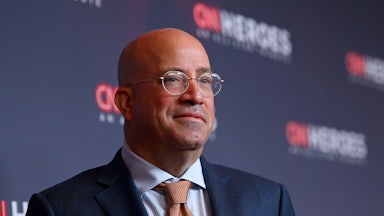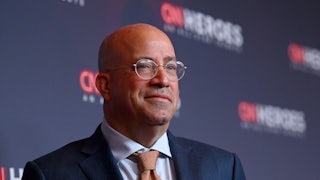When CBS co-president Neeraj Khemlani defended the network’s decision to hire former Trump administration official Mick Mulvaney earlier this year, he was refreshingly and depressingly honest about the move. “Being able to make sure that we are getting access to both sides of the aisle is a priority because we know the Republicans are going to take over, most likely, in the midterms,” Khemlani told staff of the network’s morning show, where Mulvaney had just made his inaugural appearance. “A lot of the people that we’re bringing in are helping us in terms of access to that side of the equation.”
CBS’s decision to hire Mulvaney was greeted with understandable and justified criticism. Mulvaney had held several jobs in the Trump administration—mostly as director of the Office of Management and Budget and as acting chief of staff—and did all of them with the requisite degree of cynicism and dishonesty. He has done little to explain the multitude of wrongs he authored while holding power and less to make amends for his role in an administration that unlawfully attempted to hold onto power after voters evicted it from the White House; CBS was nevertheless happy to welcome him into the fold. Khemlani’s calculus matched Mulvaney’s cynicism in tone if not in volume: The network needed access to Republicans, and Mulvaney, a former congressman, offered a way in. It was simply transactional.
On Tuesday, MSNBC hired its own former administration official: Jen Psaki, the recently departed White House press secretary. Psaki, according to reports at Variety and others, will begin appearing on MSNBC programming in the lead-up to November’s midterm elections; she will host a “new streaming program” set to launch sometime early next year. “Her extensive experience in government and on the campaign trail and perspective as a White House and Washington insider is the type of analysis that sets MSNBC apart,” MSNBC president Rashida Jones said in a statement. “She’s a familiar face and trusted authority to MSNBC viewers, and we look forward to her insight during this consequential election season.”
Psaki’s hiring has caused fewer rumpled feathers than Mulvaney’s, though that too is not surprising—Biden’s former mouthpiece cleared the low bar of “not participating in a coup,” after all. But the job of the White House spokesperson is to spin—and, lest it need to be underlined, sometimes lie to—the press. Psaki did her job in a more or less normal way, which is to say that she spun and sometimes lied, just as members of the White House Press Corps expect the White House spokesperson to spin or lie: In other words, she spun and lied within the accepted parameters of the always chummy and plummy White House press room. Mulvaney, by contrast, played an instrumental role in the scandal that led to Trump’s first impeachment; when this was discovered, he told reporters to “get over it” and participated in the administration’s cover-up attempt. (Again, these are such low bars to either clear or trip upon.)
MSNBC clearly sees Psaki as some kind of big “get.” Why that is is something known only to the network’s executives: Her hire is nominally surprising given her lack of on-air or broadcast experience and her obvious lack of anything approaching objectivity. Still, in the streaming age, networks seem more willing to take chances on the sort of programming they might not have dared attempt in the broadcast-only era. (News networks, in particular, really don’t seem to know what to do with streaming technology or how to grow an audience exclusive to it, as the CNN+ debacle testifies.) If whatever Psaki’s show ends up being—if it ends up existing at all—falters, it seems unlikely anyone outside of the insular coven of media reporters will tarry too long wringing their hands over it.
Still, it’s hard not to come to the conclusion that Psaki is ultimately being hired for the same transactional reasons that prompted CBS to add Mulvaney to its stable. Access to Democrats is easier to get for reporters in 2022, but Psaki, a well-liked figure in the White House—unlike Mulvaney—still has an active Rolodex. Her job on the network, moreover, ultimately won’t be that different from the former acting chief of staff’s—or, for that matter, her former one. She’s there to offer the perspective of team blue, just as Mulvaney is there to cheer on team red. Ultimately, they’re both there to be predictable: They will find their camera, look into the lens, and offer canned partisan spin. The chance you’ll catch them saying something truly surprising on air is approximately nil.
This, ultimately, is what makes these kinds of hires disheartening. Over the last several years, we’ve been repeatedly exposed to just how vapid and destructive our television news’ obsession with having self-interested representatives of both parties on to air their respective sides’ poll-tested banalities can be. It has an especially destabilizing effect given the crucial role of asymmetric polarization, wherein both the Democratic and Republican “talking points” being aired will seem equally inauthentic, given that both are being aired by people with clear partisan loyalties. The result is a kind of political fun-house mirror, in which reality is constantly being distorted and no one learns anything material or real.
It’s especially disheartening because news networks have, particularly during the Trump years, marketed themselves as bulwarks of truth and democracy in an age of rising authoritarianism. That is, ultimately, a lofty goal for them to strive for, but the addiction to hiring partisan figures undercuts it. Psaki isn’t being hired to further any journalistic goal. She’s there to build even more bridges with Democrats and, from time to time, to go on television and provide the party’s talking points about the issues of the moment. She’s a surrogate, not a journalist—and an expensive one at that: When you consider how many flesh-and-blood reporters MSNBC could have hired to bring in actual news stories, and perhaps contribute in more material ways to the defense of democracy, for what they’re paying Psaki to essentially undercut this mission, it’s hard to ignore the exhausting emptiness of this exercise.










